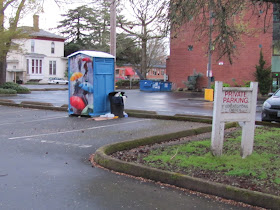Revised: December 2018
By Sarah Owens and Michael Livingston
When a downtown church installed a portable toilet in their parking lot last June, they felt they were solving a problem, and they were. However, they did not realize that their solution would bring new problems, which it did. People who need after-hours access to public toilets also need a place to sleep, and it only makes sense to want to sleep near toilet facilities. So, after a bit, the church made adjustments.
The decision to allow people to sleep on the church grounds was not an easy one for several reasons, not the least of which was the amount of work needed to support the decision.
Organizers determined that a "Rise & Shine" team of 10 to 15 people was needed to enforce the overnight-only (10 pm to 8 am) limitation, and make sure the facilities were kept clean. Research and analysis was needed, including interviews with police and others in the community who had dealt with similar situations. And, as problems developed, they needed to meet as a congregation to reassess the situation.
The decision was made to continue to allow sleeping on the church grounds.
But, over time, despite all efforts, and the sincere belief that their experience would be different, the problems persisted. There were people who were willing and able to obey the rules, but they could not protect themselves, or the church grounds, against those who were not. The church grounds were, in effect, no different from the street in this regard. Recently, the decision was made to end the program. [http://uccsalem.org/clientimages/26941/2016-03-16.pdf].
 |
| First Congregational UCC Front Porch |
Exactly two years earlier, St. Mark Lutheran, next door, had had to make the same decision, namely, to end the permissive use of their porches for overnight sleeping.
As part of St. Mark Lutheran's assessment process, there were brief interviews of seven of their "guests", all of them white, four identifying male, ages 25 to 55, and two female, in their 50s.
 |
| St. Mark Lutheran Front Porch |
Asked, "Why do you choose to sleep on [this church's] porch?", two replied that the porch was "better than UGM", the others said because it was safe.
Asked, "Why don't you stay at [the Mission] or Simonka [Place]?", they named as reasons being forced to accept UGM's religion, its rules, the presence of alcoholics and addicts, the lack of ventilation making them sick, and not being allowed back.
 |
| First Congregational UCC Back Porch |
Asked, "Is there anyone helping you: a caseworker, a friend, or family?", three said a friend or friends, one said he had stayed with his son and daughter-in-law, but had "worn out his welcome", one said a caseworker, and another said no, she didn't need anyone.
Asked where they went to use a bathroom, they all, except for Barbara, said Safeway, McDonald's, and sometimes the Catholic Church.
Asked whether they had any questions for the interviewers, four said they needed a place to store belongings during the day, one said he could make rent but needed a security deposit for an apartment, another said he didn't want a hand-out, but a hand up.
Asked what is the answer to homelessness, one replied help getting an apartment and a job, another said prayer and "being in God's will", another said "a homeless tent city with rules."
St. Mark Lutheran decided to turn its energies to supporting the Salem Homeless Coalition.
People still sleep on St. Mark Lutheran's porches, especially on rainy nights, but they move on early every morning.
Probably it will take awhile for the word to get around that it's No Sleeping No Camping again at the church with the toilet. And probably some will return despite knowing it's not allowed, perhaps feeling they have nowhere else to go. Hopefully, they, too, will move on early every morning.
 |
| First Congregational UCC, Front |
[December 2018 Update: in addition to hosting emergency overnight warming shelters during the 2015-2016 season, the First Congregational UCC have continuously maintained the chemical toilet on its grounds, but have not reinstated their "Sleeping Ministry."]



No comments:
Post a Comment